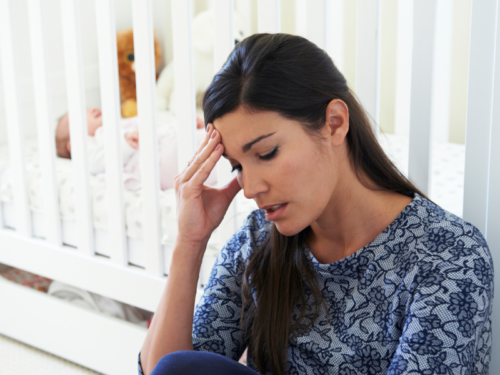
Table of Contents
Signs of Postpartum Anxiety That You Should Know
Written By: Charlie Health Editorial Team

Clinically Reviewed By: Dr. Don Gasparini
March 8, 2024
6 min.
If left untreated, postpartum anxiety can greatly affect a new parent’s quality of life and ability to bond with their baby.
Learn more about our Clinical Review Process
Table of Contents
Experiencing some level of anxiety after becoming a parent is common and normal. However, if these feelings become overwhelming or interfere with daily functioning, it may be postpartum anxiety—an anxiety disorder affecting up to 20% percent of people after childbirth (sometimes known as perinatal anxiety since onset can be during pregnancy, too).
Like other perinatal mood and anxiety disorders (PMADs), many cases of postpartum anxiety go undiagnosed, yet if left untreated, it can greatly affect a new parent’s quality of life and ability to bond with their baby. That’s why it’s crucial to know the signs of postpartum anxiety and seek help when needed. Below, we delve into common signs of postpartum anxiety and how to seek support for the condition.

Check out our maternal mental health program
Individual therapy and supportive group sessions with other new moms.
What are the signs of postpartum anxiety?
Most often, postpartum anxiety presents as intense and excessive worry or fear about the well-being of a baby, oneself, or other aspects of parenthood. It can also manifest as physical symptoms like restlessness, rapid heartbeat, and difficulty sleeping. While postpartum anxiety symptoms may differ from person to person, some common symptoms include:
- Excessive worry about the baby’s health, safety, or well-being
- Difficulty sleeping, even when the baby is asleep
- Racing thoughts
- Irritability and restlessness
- Physical symptoms (rapid heartbeat, dizziness, or trembling)
- Avoidance of situations that trigger anxiety, such as being alone with the baby
- Persistent feelings of guilt, inadequacy, or fear of being judged as a parent
- Difficulty bonding with the baby or experiencing intrusive thoughts of harm coming to the baby
In rare cases, postpartum anxiety (or other PMADs like the baby blues, postpartum depression, and postpartum psychosis) can escalate to include thoughts of harming oneself or others. If you’re having thoughts of harming yourself or someone else, including an infant, this is a mental health emergency, and you should contact The Suicide & Crisis Lifeline by calling or texting 988.
What are some risk factors for getting postpartum anxiety?
Knowing the risk factors for postpartum anxiety can help birthing people and their support networks recognize and address symptoms early on, better mitigating the impact of the mental health condition. Below are several risk factors that may increase the likelihood of experiencing postpartum anxiety, but keep in mind that having one or more of these risk factors doesn’t necessarily mean that someone will develop the condition.
History of anxiety disorders
People with a personal or family history of anxiety disorders, including generalized anxiety disorder, panic disorder, or obsessive-compulsive disorder (OCD), are at a higher risk of developing postpartum anxiety.
History of postpartum depression or anxiety
Research shows that women who have previously experienced perinatal anxiety are more likely to experience it in subsequent pregnancies. Also, if you have experienced postpartum depression, the baby blues, or another perinatal mood disorder, you may be at an increased risk of experiencing postpartum anxiety, according to the research.
Stressful life events or trauma during pregnancy or childbirth
Stressful life events, such as financial difficulties, relationship problems, or complications during pregnancy or childbirth, can contribute to postpartum anxiety.
Lack of social support
Limited support from family, friends, or partners can increase feelings of isolation and overwhelm, becoming a risk factor for postpartum anxiety.

How Dejah J. Managed Postpartum Depression With Charlie Health
Charlie Health Editorial Team
How can I reduce my risk for postpartum anxiety?
While some risk factors for postpartum anxiety are unavoidable (like those that are genetic), there are proactive steps you can take to support your emotional well-being during pregnancy and after childbirth. Here are six strategies for taking care of your mental health during pregnancy and postpartum, which may reduce the risk of postpartum anxiety.
1. Build a strong support network
Surround yourself with supportive family members, friends, and healthcare professionals who can offer emotional support, practical assistance, and understanding during pregnancy and postpartum to reduce and help you cope with new mom burnout.
2. Prioritize self-care
Understand that self-care is crucial for your well-being as a new parent. Make time for activities that promote relaxation, lower anxiety levels, and overall health, recognizing that taking care of yourself enables you to better care for your baby.
3. Communicate openly
Recognize the importance of open communication with your partner, family members, and healthcare providers about your feelings, concerns, and needs as a new mother. Being able to express yourself openly can foster understanding and support, easing the emotional stressors of motherhood.
4. Plan ahead
Understand that planning ahead for the postpartum period is essential for mothers. Arrange practical support, such as meal deliveries, childcare assistance, or household help, to alleviate some of the stressors associated with adjusting to life with a newborn, allowing you to focus on your well-being and bonding with your baby.
5. Be kind to yourself
Be kind to yourself by identifying negative self-talk and perfectionistic tendencies as a mother. Challenge unrealistic expectations, recognize that it’s okay to ask for help, and prioritize your own well-being in order to be the best mother you can be.
6. Seek professional support
Understand that seeking support from a therapist or behavioral health professional experienced in perinatal mental health is a valuable resource for mothers. Therapy provides a safe space to explore your emotions, learn coping strategies, and develop a support plan tailored to your unique needs as a new mom. If you are experiencing anxiety or depressive symptoms after childbirth, you may benefit from professional mental health support.

Treatment for postpartum anxiety
Treatment for postpartum anxiety typically involves a combination of therapeutic interventions and, in some cases, medication. Working closely with healthcare providers to develop a personalized treatment plan tailored to your individual needs and circumstances is essential. With proper support and treatment, postpartum anxiety can be effectively managed. Here are some common approaches to treating postpartum anxiety:
Therapy
Therapy sessions provide a safe space to explore and address underlying fears, intrusive thoughts, and coping strategies. Therapists may also teach relaxation techniques, stress management skills, and cognitive restructuring to help manage anxiety symptoms.
Cognitive-behavioral therapy (CBT), mindfulness-based therapies, acceptance and commitment therapy (ACT), and parent-infant psychotherapy can be highly effective in treating symptoms of postpartum anxiety.
Supported groups
Joining a postpartum support group or attending peer-led meetings can provide emotional support, validation, and practical advice for mothers experiencing postpartum anxiety. Connecting with other mothers who understand what you’re going through can reduce feelings of isolation and help you feel less alone in your struggles.
Support groups offer a safe space to share experiences, ask questions, and learn from others who have successfully navigated postpartum anxiety. Peer support can be especially empowering for mothers, as it fosters a sense of community and solidarity during a challenging time.
Medication
In cases where postpartum anxiety is severe or significantly impacts daily functioning, healthcare providers may recommend medication as part of the treatment plan. Selective serotonin reuptake inhibitors (SSRIs), such as sertraline or fluoxetine, are commonly prescribed antidepressants that can help alleviate anxiety symptoms.
It’s essential to discuss the risks and benefits of medication with a healthcare provider, especially if you’re breastfeeding, to ensure the safety of both the mother and baby. Medication may be used alone or in combination with therapy, depending on the severity of symptoms and individual circumstances.
How Charlie Health can help with postpartum anxiety
If you or a loved one are struggling with postpartum anxiety, Charlie Health is here to help. Charlie Health offers a virtual Intensive Outpatient Program (IOP) that provides more than once-weekly mental health treatment for young people dealing with complex mental health conditions, including a dedicated maternal mental health program for those struggling with perinatal mood and anxiety disorders like postpartum anxiety. Our expert clinicians incorporate evidence-based therapies into individual counseling, family therapy, and group sessions. With treatment, managing your postpartum anxiety is possible. Fill out the form below or give us a call to start healing today.




